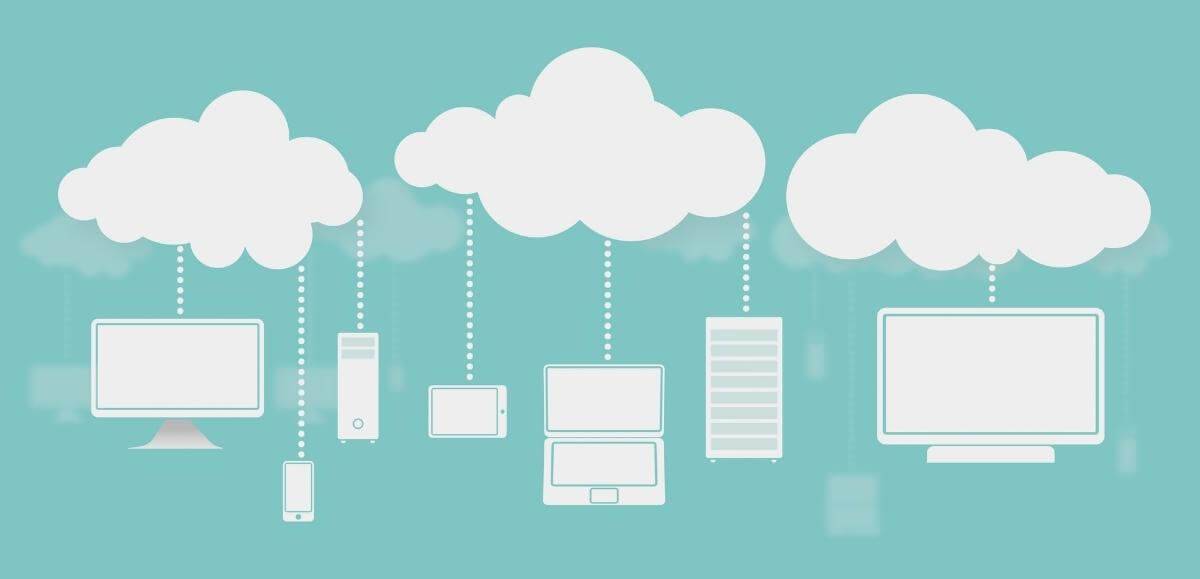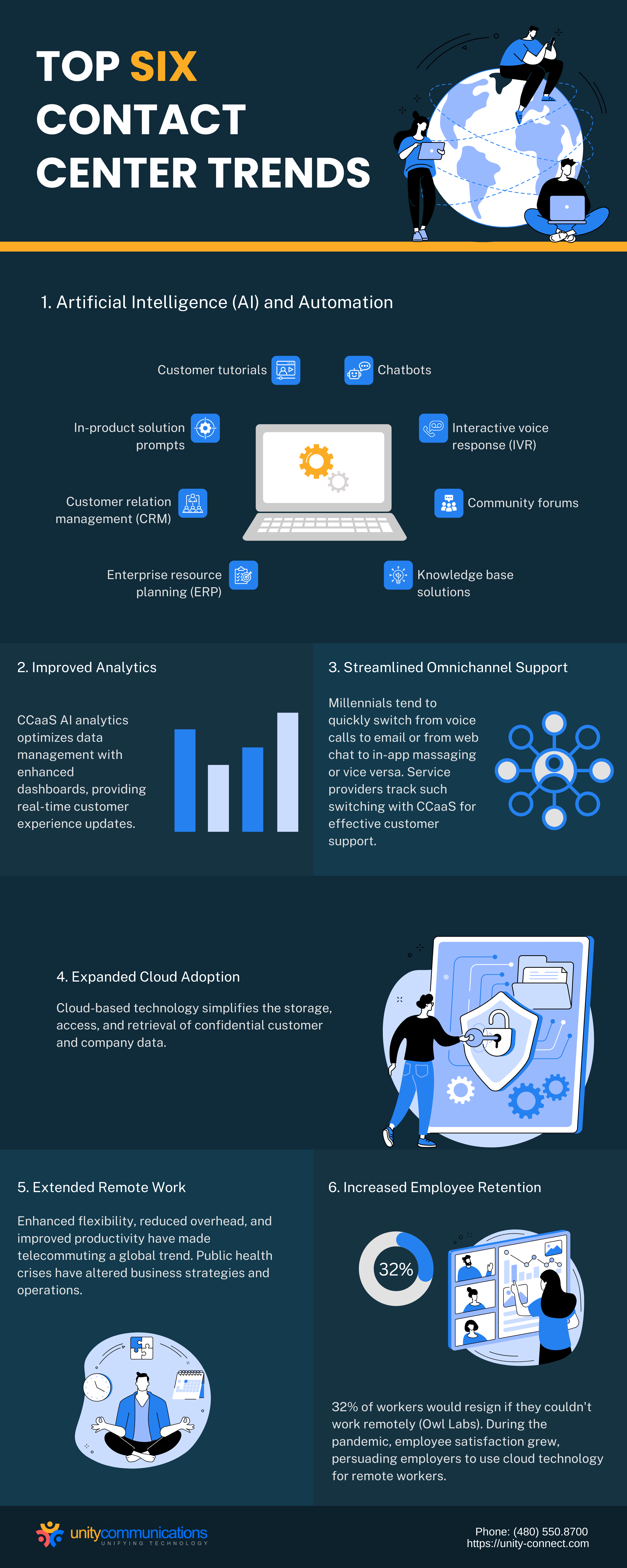IN THIS ARTICLE
Table of Contents
Contact centers play a crucial role in strengthening companies’ customer bases. Digital advancements and global issues have led to buyer demands and preferences. Therefore, current offerings and strategies require constant updates to accommodate these changes.
Explore contact center as a service (CCaaS). Discover what is happening in the contact center industry through the trends discussed in this article. Use them to make informed decisions about products and services you must acquire or develop.
Top Six Contact Center Trends in 2025

Companies rely on contact centers to manage their inbound and outbound customer service across multiple channels: phone calls, live chat, email, and social media. These centers handle responses to customer inquiries regarding products and services. Reaching out to consumers for promotional activities or problem-related follow-ups is also part of the task.
Setting up a contact center in-house requires considerable funding. Labor, infrastructure, and office space are all expenses. Because customer service is a non-revenue-generating task, companies often outsource it. This saves them time and money in hiring, training, and technology acquisition costs. Outsourcing allows them to focus on their core business functions.
But as technology advances and global issues persist, consumer needs and choices change. These factors constantly drive contact centers to look for ways to enhance their offerings. However, they can’t simply offer innovative services to stand out. They need a unified solution to deliver comprehensive, value-added services.
CCaaS, therefore, becomes a crucial platform for companies to thrive in highly competitive markets. The cloud-based solution integrates all channels, services, and capabilities contact centers need. It helps them execute rapid support to ensure customer satisfaction and retention.
Understand the role of consumer support hubs and CCaaS in providing the best customer experience. Go through the following contact center trends:
1. Artificial Intelligence (AI) and Automation
Quick actions and responses to customer queries help businesses survive today. Digital modernization allows them to make such activities possible but at a high cost. But hiring a third-party contact center that uses modern technologies helps them streamline customer service, reducing labor and infrastructure costs.
A study from DataM Intelligence shows that the global contact center outsourcing market will expand at a 3.4% compound annual growth rate (CAGR) by 2029. The research firm says that the increasing use of automation and AI in the industry primarily influences growth.
CCaaS platforms use AI to automate and accelerate responses to billions of repetitive customer requests. These platforms help deliver a superb consumer experience. The following advantages show how AI-powered contact center software helps satisfy and retain buyers.
- Offers self-service and personalized support
- It enables smart call routing and task distribution
- Delivers instant replies to simple customer inquiries
- Matches customer preferences with the best agents for complex issues
- Provides real-time access to customer profiles and transaction history
- Automates presentation of product tutorials or problem-resolution guidelines
- Facilitates smooth customer-agent conversations
- Simplifies data collection and analysis
CCaaS solutions contain the following standard AI-powered tools to deliver the listed benefits:.
- Chatbots
- Interactive voice response (IVR)
- Community forums
- Knowledge base solutions
- Customer tutorials
- In-product solution prompts
- Customer relation management (CRM)
- Enterprise resource planning (ERP)
2. Improved Analytics
Whether through voice or non-voice accounts, massive numbers of online transactions happen daily. These deals contain crucial data showing significant changes in customer preferences and needs. Companies thus monitor and analyze such information to align and improve their offerings.
The traditional approach lets teams analyze data based on predefined business questions through visualization dashboards. But the dashboards can’t keep pace with the evolving market demands. Addressing new business questions consumes more time and requires technical skills. These add to company expenses and backlogs.
Businesses hire contact centers for low-cost, automated data analysis to address this. Service providers have an AI analytics feature in their CCaaS platforms to streamline big data management. This capability includes advanced dashboards that provide real-time updates on customer experiences.
3. Streamlined Omnichannel Support
Salesforce’s 2023 “State of the Connected Customer” report highlights digital consumers’ changing expectations. It shows that 80% of customers value the company’s experience as much as its products or services, emphasizing the need for seamless and personalized service across all channels. Consumers expect fast, convenient support.
In today’s competitive landscape, businesses that fail to meet these expectations of speed and convenience risk falling behind. Many are turning to service providers for omnichannel customer support, especially channel-switching millennials. They seamlessly switch between voice calls, emails, and web chats, while others prefer one channel for immediate information.
Companies are increasingly adopting cloud-based CCaaS solutions to address these diverse preferences. This technology facilitates real-time responses and unifies different communication media, thus enabling companies to track customer interactions across channels efficiently.
By leveraging CCaaS platforms, businesses can significantly enhance customer satisfaction and foster brand loyalty, effectively responding to the modern customer’s need for a connected and personalized service experience.
4. Expanded Cloud Adoption
Enterprises of various sizes have adopted cloud technologies. They aim to make their in-house communications and data management flexible. But when the pandemic hit a few years ago, businesses suddenly shifted to telecommuting and expanded their use of digital technologies. Cloud communications, in particular, have become vital for contact centers.
Service providers use CCaaS platforms to streamline collaboration and communications. Thus, remote agents can work seamlessly. The Cloud-based technology gives teams a real-time overview of daily processes and transactions. It also simplifies data storage, access, and retrieval of confidential customer and enterprise data.
Cloud solutions have become one of the most prominent contact center trends. However, some companies still believe these platforms are unstable. Deloitte found that 60% of companies are skeptical about the cloud migration of workforce management capabilities. Inaccessibility during network and server failures are the barriers.
Nevertheless, CCaaS offers significant benefits for contact centers:
- Cost Reduction. Eliminate expenses on installing, operating, and maintaining on-premises infrastructure. Businesses just have to pay monthly subscription fees for their desired capabilities.
- Flexibility. Enable customer service teams to continue work even at home. Cloud technology allows agents to access crucial data in real time.
- Data Protection. Prevent data theft and hacking through strict security measures such as multifactor authentication and encryption.
- Functionality. Include application programming interfaces (APIs) to sync data with business systems such as CRM and ERP. The solution lets agents manage users, gain statistics, and perform outbound campaigns.
5. Extended Remote Work
The public health crisis has significantly changed every company’s strategies and operations. Employees have also altered their lifestyles because they must work from home to ensure safety. Meanwhile, customers rely heavily on online transactions to meet their needs.
Due to these factors, businesses enhance their collaboration tools. They intend to help their remote workers provide excellent customer support consistently. Decreased overhead, improved flexibility, and increased productivity have made telecommuting a stable contact center trend.
6. Increased Employee Retention
In an evolving work environment, workplace flexibility increasingly influences employee retention. The “State of Hybrid Work 2023” report by Owl Labs highlights this trend. It reveals that 69% of employees believe office work is often required due to traditional expectations, not necessarily because it’s more productive.
The study also found that 23% of employees changed companies in 2023, with full-time office workers more likely to switch jobs than their hybrid or remote counterparts. This suggests a growing preference for flexible work arrangements among the workforce.
Businesses are allowing employees to work remotely and on-site to accommodate changing preferences and reduce turnover. Such flexibility meets employee needs, ensures customer service consistency, boosts productivity, and keeps companies competitive. Work arrangements that meet employee expectations boost job satisfaction and retention.
The Future of Contact Centers
Technological and consumer behavior changes are shaping the future of contact centers. According to Markets and Markets, the contact center software market will grow from $41.9 billion in 2023 to $109.7 billion in 2028, indicating a growing reliance on advanced technology.
According to Twilio’s report, accelerated adoption of AI and machine learning for improving customer service personalization is one of the main factors driving this growth. The integration of these technologies aims to offer more tailored, efficient customer interactions. Comm100’s report indicates a trend towards mobile-based customer service and a significant improvement in response times, reflecting an increasingly agile and responsive service landscape.
Ozonetel’s report highlights a notable reduction in call abandon rates, pointing towards more efficient and customer-centric service strategies. Salesforce’s insights into the rising consumer expectations for seamless, omnichannel experiences align with these trends, indicating a future where contact centers are technologically advanced and adept at providing a cohesive customer journey across various platforms.
The emphasis on cloud-based solutions, AI, and omnichannel strategies indicates a future where contact centers are expected to be more adaptable, data-driven, and customer-focused. The integration of advanced technologies is set to revolutionize the way contact centers operate, making them more efficient and capable of meeting the dynamic needs of the modern consumer.
The Bottom Line

Buyers continue to seek simple approaches to resolving problems or getting support. However, they have varying tastes in communication channels. Such differences in preferences challenge organizations’ ability to provide unmatched customer service.
Many businesses tap into contact centers like Unity Communications to deliver an excellent buying experience. These hubs offer a cost-efficient, cloud-based solution. They help streamline responses to massive consumer inquiries.
However, companies need to know the latest and upcoming contact center trends to take full advantage of CCaaS. The resulting insights guide their efforts to produce more innovative products and services that meet customer demands.





